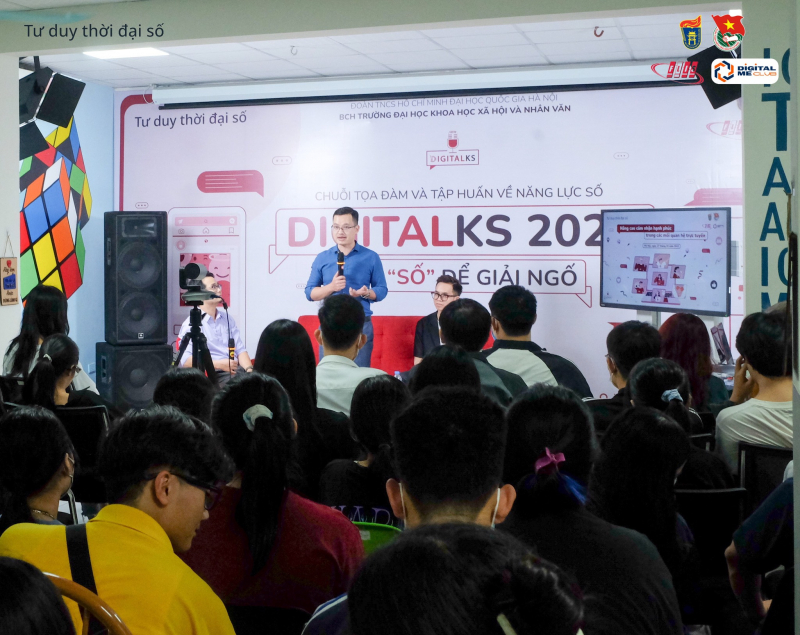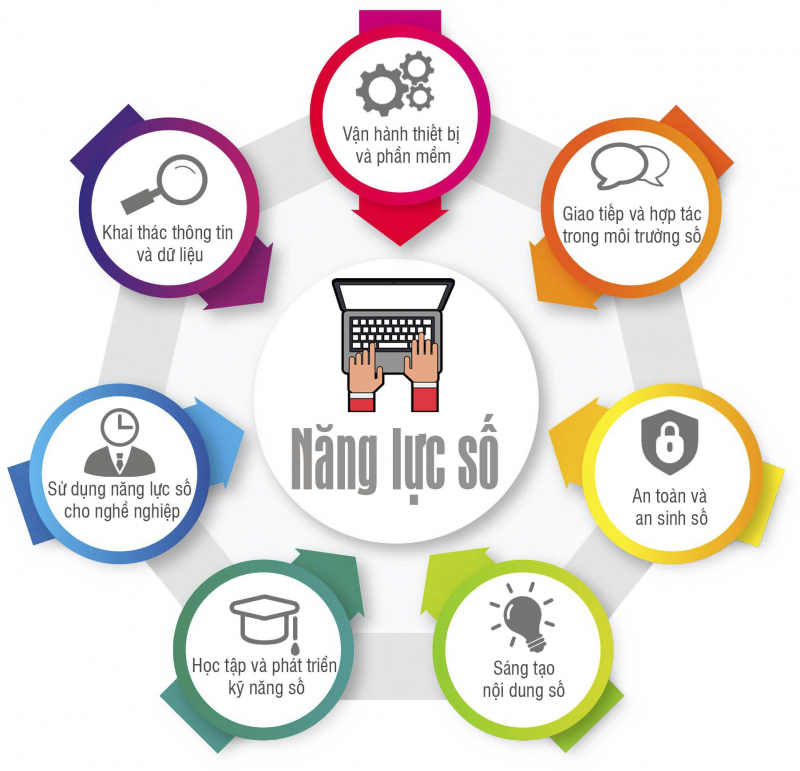Digital literacy is still a relatively new concept and is not widely known in Vietnam. However, it can be affirmed that, in the context of economic recovery after the pandemic, with the inevitable need for digital transformation in all aspects of social life, digital literacy has now become a top priority criterion for young human resources.
Grasping this trend early, from the 2020-2021 school year, the University of Social Sciences and Humanities has become an official partner of Meta Group (formerly Facebook) in the Digital Age Thinking program.

Prof. Dr. Hoang Anh Tuan, Rector of the University of Social Sciences and Humanities (Photo: NVCC)
Building the first digital competency framework in Vietnam
- It is known that the University of Social Sciences and Humanities is the first unit to implement the project of improving digital capacity for students in the university sector. Could you tell us more about the results of this implementation process as well as the advantages and difficulties that the University has encountered?
With the desire to have a comprehensive view of the current state of digital competence of young people, we conducted a survey and built the first digital competence framework in Vietnam specifically for students. This digital competence framework is also the basis for developing specialized courses on digital competence and publishing important publications such as the Digital Competency Development Handbook and the Digital Competency Monograph.
In addition, the University of Social Sciences and Humanities has also focused on supporting students in developing digital capacity through extracurricular activities.
The USSH Digital Me Club, established under the School Youth Union, has become an important resource contributing to the successful organization of forums and competitions for students nationwide to raise awareness and understanding of digital capacity, spreading messages about participating in a safe and positive digital environment.
- In your opinion, what benefits has the digital capacity building program implemented by the School brought to students, especially in the context of digital transformation deeply affecting the labor market in Vietnam?

Seminar and training on digital capacity for students at the University of Social Sciences and Humanities
It can be seen that in recent times, the characteristics of industries and professions in Vietnam have changed significantly. Young people, pupils and students now not only need to prepare themselves for specific jobs, which have been named in the labor market, but also need flexibility and the ability to build their own skill sets to adapt to the constantly changing nature of future jobs.
Thanks to the influence of digital capacity building activities, students of the University of Social Sciences and Humanities soon gained awareness and understanding of this new concept, and proactively took advantage of learning and exchange opportunities as well as self-improvement to gain better digital capacity.
It could be a greater proficiency and agility in using digital tools (such as personal computers, smartphones, social networks and application platforms, software) or the ability to be skeptical, think critically to evaluate a huge amount of information, it could also be the ability to maintain safe and positive interactions when participating in digital communities to aim for balance for individuals and the whole society based on the foundation of multi-dimensional views and the ability to empathize and respect differences.
And most importantly, students will be more prepared to familiarize themselves with and improve their digital skills, serving their lifelong learning and career development.
Integrating students into the school's digital transformation ecosystem
- How has equipping and improving digital capacity for students created a breakthrough and promoted the school's digital transformation process, sir?
Digital transformation is a process of change associated with the application of digital technology to all aspects of human social life. By being equipped and improving digital capacity early, students of the School will bring experiences, habits, and behaviors related to digital technology from daily life into the learning, research, and work process.
They will comfortably integrate into the digital transformation ecosystems provided by the School or later by agencies, businesses, and employers.
In other words, what we have done in the past has contributed to preparing the most important factor of any digital transformation process: the human factor. From here, the application of digital technology in teaching and learning, in scientific research methods or administrative and management solutions will all be more effective.
- The process of improving digital capacity for students is a personalized process for learners. In reality, this process faces many difficulties. Could you share the experiences and lessons of the University of Social Sciences and Humanities?
It can be said that, as “digital natives”, Vietnamese students have full potential to develop comprehensively in the digital environment, however, the development path and trend of each young person is very different.
So what we need to do is equip them with basic knowledge and skills about the digital world, provide them with a multi-dimensional view, help them build their own value system based on the spirit of respecting differences, the ability to empathize and the ability to be reasonable in doubt. And don’t forget that we ourselves need to regularly practice these values in our interactions with young people.
Improving digital literacy also means helping young people understand and take care of their physical and mental health while using these platforms. In addition to avoiding prolonged exposure to digital devices, many other factors need to be considered, such as environmental conditions, safety, privacy, etc.
Fully aware of that, activities aimed at developing digital capacity at the University of Social Sciences and Humanities are all implemented methodically, based on survey results, careful research, and efforts to meet the needs of many different target groups.

Digital Competency Framework for Students
- To help universities deploy digital capacity in the most favorable way, what suggestions and recommendations do you have?
The Prime Minister has approved the National Digital Transformation Project by 2030, in which Vietnam is expected to be among the top 50 countries in e-Government; and can improve the competitiveness of the economy with the goal of developing a digital economy that will account for 30% of GDP.
To train high-quality human resources with appropriate digital capacity, the ability to adapt and master technology, actively participate in the digital transformation process and be flexible in the face of all changes in the labor market, first of all, leaders, managers, educators and parents need to clearly understand the importance of digital capacity for students.
Therefore, digital competence needs to be included in the curriculum at different levels of education, with different levels of access, and there should be regular programs to survey and assess citizens' digital competence based on digital competence frameworks corresponding to specific target groups.
At the same time, we also have an obligation to create an open educational environment that enables young people to debate, share, explore and establish the principles they need for the digital space.
We have a responsibility to educate and nurture a new generation of digital citizens who are digitally competent (creating, working, sharing, socializing, exploring, playing, communicating and learning); actively and responsibly engaged (values, skills, attitudes, knowledge) in the community (local, national, global) at all levels (political, economic, social, cultural and intercultural); engaged in a dual process of lifelong learning (in formal and/or informal settings) and who promote the protection of human dignity.
Thank you very much!
Author:Hong Hanh (People's Representative Electronic Newspaper)
Newer news
Older news